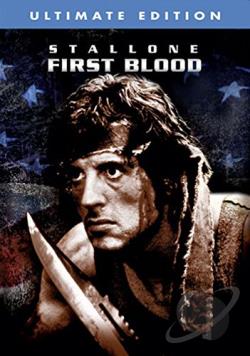Dir. Ted Kotcheff
Starring: Sylvester Stallone,
Richard Crenna, Brian Dennehy, Bill McKinney
I had always thought that the
Rambo series of films was the apogee of dumb ‘80s action movies, the U.S.
fighting on screen the wars it was not fighting in real life (see also the
aerial duel with Soviet MiGs in Top Gun).
My memory is of Rambo, stripped to his vest and with a red headband, swinging
through the jungles and killing the Vietnamese – revenge for a war which America America
John Rambo (Sylvester Stallone)
is a hero of the Vietnam war, a survivor of a crack Green Beret special forces
team. Only two of the team made it back alive from ‘Nam Nam Hope
And yes, there is action – a
jail break, a motorcycle / police car chase, a literal cliff-hanger during a helicopter
attack, a guerrilla war in the woods, rocket launchers, an escape from a
caved-in mine, another car chase, explosions throughout town, and then the
final reckoning between Rambo and Teasle. And these scenes are good. There is
plenty of punch and pow to them. The drama rollocks along and gives the
audience no time to get bored.
But the film is about more than
that. It is about the consequences of action. Rambo justifies his actions with
the simple phrase “They drew first
blood.” But really it wasn’t Teasle who drew first blood: it was Colonel
Trautman (Richard Crenna), the Green Berets former commanding officer, acting
on behalf of the state, who drew first blood. He trained Rambo to be a
super-soldier with only one function: to kill in order to win the Vietnamese
War. But with that war lost Rambo has no place in society. He is obsolete. Everything he went
through was no no avail, the sacrifices of him and his team-mates was to no
avail. And now American society wants to forget that period of its history. America has turned its back on those who fought
in the name of America
Sylvester Stallone, to be fair,
gives a bravura performance. He doesn’t have many lines. He speaks in the first
couple of scenes. He shares a few words with Teasle in the woods and then to
Trautman over the walkie talkie. But he is mostly silent until the dramatic
last scene in which the human cost of the war to Rambo is brought home. What
becomes clear is that it is not just the covenant made with America Saigon bar: “There’s pieces of him all over me, just
like this, and I’m tryin’ to pull him off, you know? My friend that’s all over
me. I’ve got blood and everything and I’m tryin’ to hold him together. I’m
puttin’… the guy’s fuckin’ insides keep comin’ out! And nobody would help!
Nobody would help! He’s sayin’, sayin’ “I wanna go home! I wanna go home!”
Sayin’ my name: “I wanna go home Johnny! I wanna drive my Chevy!” And I said
“With what? I can’t find your fuckin’ legs! I can’t find your legs!” Handled
poorly those lines could have been hilarious. Here they are deeply moving as an
unarticulate man finally lets everything out. Rambo has felt alone because
there was no one he can share this with. He has been unsuccesfully trying to
speak to Trautman at Fort
Bragg Washington
There is a nasty side to all
this. Dwell on Rambo’s words: “I did what
I had to do to win. But somebody wouldn’t let us win!” But of course. There
was no way the Vietnamese could have legitimately defeated the United States Asia
were betrayed. They were betrayed so that they could not win the war, and then
they were betrayed by society when they returned home. This is exactly the sort
of myth of a ‘stab in the back’ that grew up in Germany
First Blood flipped my preconceptions about the movie on its head.
Yes, it is a violent action movie. But it has a soul, unveiled in the last
scene by Rambo’s emotional outpouring of words. It subverts the genre. The
protagonist is maybe not the hero we expect; instead he is a deeply damaged
individual. This adds more depth and character to what I thought was just going
to be another dumb ‘80s action movie.
 |
| The chopper crew saw their chance to finish off Coldplay for good |
What have I learnt about Washington
The biggest thing to see is the
mountains – huge, craggy, thick with trees and riven with sheer gorges. They
look impenetrable, but it is clear that men have been exploiting them for
decades. Rambo surprises a hunter, he stumbles over a junkyard strewn with
forgotten machinery and vehicles, and he takes shelter in an abandoned mine.
The town of Hope
It therefore falls to the
Sheriff’s Department to keep that Holidayland “boring”. Drifters and vagabonds are not welcome – particularly
those who might remind the fun-loving holidaymakers of a tragic and forgotten
war. In the event of a real emergency they can call upon backup from the State
Police and even the National Guard.
Can we go there?
The town of Hope British Columbia , Canada , rather than Washington Vancouver Coquihalla
River Kawkawa Lake Road 3rd
Avenue New
Westminster Water Street
Madly, the junkyard where Rambo
gets his canvas and rope still exists. I had assumed that it was created for
the movie, but no. It can be found north of Port Coquitlam Port Coquitlam , Delmar’s
cabin was up the Pitt
River
I’m having more difficulty trying
to place where Hope was meant to be.
Captain Kerns of the State Police (Bill McKinney) says that
he can bring some men up from Monroe; Monroe is about twenty miles north-east of Seattle. Wherever
they are it is an outdoor sports centre backed by tall wooded mountains.
Overall Rating: 4/5

No comments:
Post a Comment